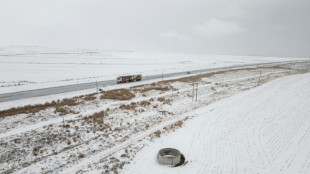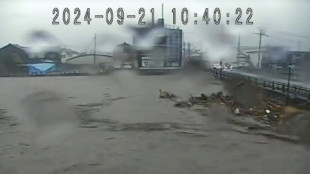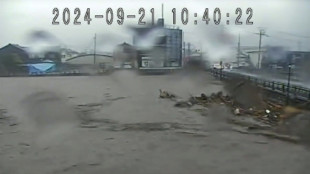
-
 Israeli jets pound Lebanon after deadly Beirut strike
Israeli jets pound Lebanon after deadly Beirut strike
-
Ten Hag bemoans Man Utd's lack of killer instinct in Palace stalemate

-
 France's Macron appoints new government in shift to right
France's Macron appoints new government in shift to right
-
Cheika proud of Leicester grit after winning start as boss

-
 Profligate Man Utd pay price in 0-0 draw at Palace
Profligate Man Utd pay price in 0-0 draw at Palace
-
Kane, Olise run riot as Bayern thump Bremen

-
 Diaz fires Liverpool top of Premier League, Man Utd held at Palace
Diaz fires Liverpool top of Premier League, Man Utd held at Palace
-
LIV champion Rahm out of LIV Team semis with severe flu

-
 Slot surprised by tearful Nunez's moment of magic
Slot surprised by tearful Nunez's moment of magic
-
Title rivals Norris, Verstappen on 'cool' front row for Singapore GP

-
 Biden talks China with 'Quad' leaders in hometown summit
Biden talks China with 'Quad' leaders in hometown summit
-
Juve and Napoli play out goalless draw in early Serie A title tussle

-
 Alcaraz fears tennis tour grind will 'kill us'
Alcaraz fears tennis tour grind will 'kill us'
-
Carey sparks recovery as Australia thrash England in 2nd ODI

-
 Leclerc, Sainz lament 'disappointing' Saturday in Singapore
Leclerc, Sainz lament 'disappointing' Saturday in Singapore
-
Bottega Veneta holds investors' aces as Madonna pops into D&G

-
 Beirut digs for victims at building flattened in Israeli strike
Beirut digs for victims at building flattened in Israeli strike
-
Verstappen stages protest over 'ridiculous' swearing punishment

-
 Bayern boss Kompany lauds 'special talent' Olise
Bayern boss Kompany lauds 'special talent' Olise
-
Diaz fires Liverpool top of Premier League, Spurs bounce back

-
 Heavy fire over Israel-Lebanon border after deadly Beirut strike
Heavy fire over Israel-Lebanon border after deadly Beirut strike
-
Ramos guides unbeaten Toulouse to Montpellier win despite Hogg scuffle

-
 Myanmar flood death toll jumps to 384
Myanmar flood death toll jumps to 384
-
Chelsea owners 'happy' with win at West Ham amid rift report

-
 Kane and Olise run riot as Bayern thump Bremen
Kane and Olise run riot as Bayern thump Bremen
-
Ramos guides unbeaten Toulouse to Montpellier win

-
 Norris pips Verstappen to dramatic Singapore pole after Sainz crash
Norris pips Verstappen to dramatic Singapore pole after Sainz crash
-
Carey takes Australia to 270 in 2nd ODI against England after collapse

-
 Two Hezbollah leaders killed in Israel's Beirut strike
Two Hezbollah leaders killed in Israel's Beirut strike
-
Hungary Danube waters reach decade high after Storm Boris

-
 Bagnaia cuts Martin's MotoGP lead with Emilia-Romagna sprint win
Bagnaia cuts Martin's MotoGP lead with Emilia-Romagna sprint win
-
Jackson double fires Chelsea to victory at woeful West Ham

-
 Fiji beat Japan to lift Pacific Nations Cup
Fiji beat Japan to lift Pacific Nations Cup
-
Kasatkina to face Haddad Maia in Korea Open final

-
 S.Africa snowfall closes roads, strands motorists overnight
S.Africa snowfall closes roads, strands motorists overnight
-
Lawyers of women alleging Al-Fayed sex abuse receive over 150 new enquiries

-
 President Museveni's son backs Ugandan strongman for 7th term
President Museveni's son backs Ugandan strongman for 7th term
-
Norris quickest as Verstappen bounces back in Singapore practice

-
 Wallabies lament All Blacks' fast start
Wallabies lament All Blacks' fast start
-
Germany's Oktoberfest opens under tight security after attacks

-
 Environmental protesters block French cruise liner port
Environmental protesters block French cruise liner port
-
Hezbollah in disarray after Israeli strike kills top commanders

-
 No place like home: Biden hosts 'Quad' leaders
No place like home: Biden hosts 'Quad' leaders
-
One dead, 7 missing as heavy rains trigger floods in central Japan

-
 Zelensky says no UK, US go-ahead to use long-range missiles
Zelensky says no UK, US go-ahead to use long-range missiles
-
New Zealand edge Australia 31-28 in Bledisloe Cup thriller

-
 Japan orders evacuations as heavy rains trigger floods in quake-hit area
Japan orders evacuations as heavy rains trigger floods in quake-hit area
-
New Zealand pilot freed in Indonesia after 19 months in rebel captivity

-
 Hezbollah in disarray after Israeli air strike kills top commanders
Hezbollah in disarray after Israeli air strike kills top commanders
-
Leading climate activist released from Vietnam jail


Heavy fire over Israel-Lebanon border after deadly Beirut strike
Israel pounded southern Lebanon Saturday, raising fears of all-out war a day after an Israeli strike on Beirut left senior Hezbollah commanders among the 37 people Lebanese officials said were killed.
With heavy equipment still working at the site of the southern Beirut strike beneath high-rise buildings, Lebanon's health ministry reported six additional dead, up from 31 earlier Saturday.
AFPTV footage showed mourners gathering in the Lebanese capital on Saturday for the funerals of three slain Hezbollah members.
Lebanese Prime Minister Najib Mikati decried "horrific massacres" and said he had cancelled his trip to the annual United Nations General Assembly in New York, "in light of the developments linked to the Israeli aggression".
Germany's foreign ministry said there was "an urgent need" to defuse tensions, as the Israel-Hamas war in the Gaza Strip threatens to engulf Lebanon too.
The UN has also voiced concern about "heightened escalation" and called for "maximum restraint" from all sides.
Israeli aircraft "struck thousands" of rocket launchers ready to fire from southern Lebanon, as well as "approximately 180" other, unspecified targets, a military statement said.
AFP correspondents reported intense Israeli strikes over a wide area of southern Lebanon including parts of the Nabatiyeh district and Jezzine further north.
- Basement bombed -
Iran-backed Hezbollah said it targeted at least seven military positions in northern Israel and the annexed Golan Heights with rockets.
Israel's military said the militants had fired "about 90" rockets by late afternoon Saturday.
Lebanon's Health Minister Firass Abiad said three children and seven women were killed in Friday's strike on an underground meeting room, which AFP journalists said left a huge crater in a densely populated neighbourhood of the capital's southern suburbs, a Hezbollah stronghold.
Israel said the strike killed the head of Hezbollah's elite Radwan Force, Ibrahim Aqil, and several other commanders.
Israel's military said it conducted a "targeted strike" against Aqil, which a source close to Hezbollah said killed 16 Radwan Force members.
"The command of the Radwan Force was meeting in the basement of the building," the source said.
The Radwan Force has spearheaded Hezbollah's ground operations, and Israel has repeatedly demanded through international mediators that its fighters be pushed back from the border.
Washington had offered a $7 million reward for information on Aqil, calling him a "principal member" of an organisation that claimed the 1983 Beirut US embassy bombing which killed 63.
- Exploding pagers -
Hezbollah said a second senior commander, Ahmed Mahmud Wahbi, was also killed on Friday. It said he headed the group's operations against Israel from the onset of the Gaza war in October until the start of this year.
It was the second Israeli strike on Hezbollah's military leadership since the Gaza war began. In July, an Israeli strike on Beirut killed Fuad Shukr, a top operations chief.
Friday's strike also followed sabotage attacks on pagers and two-way radios used by Hezbollah on Tuesday and Wednesday, which killed 39 people. Hezbollah blamed Israel, which has not commented.
Hezbollah chief Hassan Nasrallah vowed that Israel would face retribution for those blasts.
For nearly a year, Hezbollah fighters in Lebanon have traded cross-border fire with Israeli forces in stated support of Palestinian ally Hamas, whose October 7 attack on Israel triggered the war in Gaza.
After Friday's strike, Israeli Defence Minister Yoav Gallant said Israel's "enemies" would find no refuge.
Iran accused Israel of seeking to "broaden the geography of the war", and Hamas called the Beirut strike an "escalation".
Military spokesman Rear Admiral Daniel Hagari said Israel was "not aiming for a broad escalation in the region".
The months of near-daily exchanges have killed hundreds in Lebanon, mostly fighters, and dozens in Israel and the annexed Golan Heights, forcing tens of thousands on both sides to flee their homes.
Israeli Prime Minister Benjamin Netanyahu delayed by a day his departure for the United States, where he is due to address the UN General Assembly.
On Friday the UN's High Commissioner for Human Rights, Volker Turk, told the Security Council the attack on Hezbollah communications devices violated international law and could constitute a war crime.
International mediators, including the United States, have been scrambling to stop the Gaza war from becoming a regional conflict.
Critics of Netanyahu in Israel, demanding a deal to free hostages held by Hamas, have accused the prime minister of dragging out the war.
- Gaza school strike -
In Gaza on Saturday, the civil defence agency said an Israeli strike on Al-Zeitun School C, which had been turned into a displaced shelter, killed 21 people including 13 children and six women, one of them pregnant.
Israel's military said the strike targeted Hamas militants who were "embedded inside" an adjacent school, and that it had taken steps "to mitigate the risk of harming civilians".
An AFP reporter confirmed Al-Zeitun School C was hit.
In late August the United Nations said Israel had struck at least 23 school shelters since July 4.
Israel has repeatedly accused Hamas of operating from such facilities in highly urbanised Gaza, a charge the militants deny.
In a separate incident, Gaza's health ministry said an Israeli air strike hit a southern Gaza warehouse killing four people, mostly health ministry personnel.
The October 7 attack that triggered the war resulted in the deaths of 1,205 people, mostly civilians, on the Israeli side, according to an AFP tally based on Israeli official figures that include hostages killed in captivity.
Israel's retaliatory military offensive has killed at least 41,391 people in Gaza, most of them civilians, according to figures provided by the Hamas-run territory's health ministry. The UN has acknowledged the figures as reliable.
burs/kir/it/ami
B.Shevchenko--BTB

